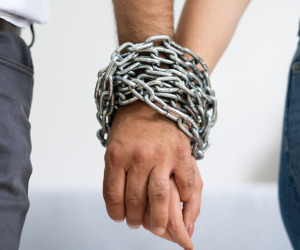Now, when we think of love stories, we typically imagine the getting to know someone phase, the date night period, eventual introductions to friends and family, becoming official, and then living happily ever after. Narcissists on the other hand approach relationships differently and never forget about their true motives of manipulation and destruction. When these evil folks decide that they want a relationship, or should I say someone to control, they ensure they repeat their devious pattern meticulously, in the aim of disarming their victims.
What are the relationship cycles of a narcissist? - 7 Stages
Here are the phases to expect...
1) It always starts with the romantic fairy tale stage
All toxic relationships start out with victims believing they have hit the jackpot with their partner. The soul-destroying love stories seem to be straight out of a classic Disney movie at the beginning, and red flags are often almost impossible to notice. Here, typically, narcissists will resort to love bombing their partner in an attempt to make themselves seem like the perfect Prince Charming. They'll spoil their partner with compliments, affection, and gifts in order to win their trust and convince them to lower their guard. After all, the more blindsided someone is, the easier they are to manipulate and eventually destroy...
2) Then comes the pressure to commit
The next step in the terrifying cycle is the pressure stage. Here, the narcissist abuser will insist that their victim exclusively commits to the relationship, no matter how little time they have been dating. At this point, the abuser will continue to love bomb their victim and justify their desire to make the relationship official by claiming to have strong feelings for their partner. They'll declare their love and may even claim to have never experienced such a special love story. You get the message, they'll say and do anything to make you want to commit to them, and consequently cut everyone else off. Plus, they certainly aren't above making you feel guilty to get what they want.
3) Something will feel off
No matter how skilled these slippery characters are, no one can pretend to be something they are not 24/7. Whatever happens, the mask eventually slips, and their narcissistic traits will soon shine through. Typically, victims first pick up on the fact that their partners lack empathy, meaning they often discard their feelings and emotions. At this stage, the difference between their present behavior and how they acted during the early days will be stark. That's right, a bad person with a fragile ego will always trip up.
4) You'll notice a change in your partner
This is when the abuse really gets into full swing. The Prince Charming at the start of your love story will definitely be a thing of the past at this stage, and here, you'll be more used to gaslighting than fancy dinners and dates. Your partner will criticize everything you do, will make cruel comments about your appearance, will threaten you, will insult you, and essentially do anything necessary to make you feel bad about yourself. This is certainly the devaluation stage and without doubt the most critical and hard-hitting for your mental health.
5) The silent treatment begins
The next phase in the narcissist relationship pattern is the silent treatment step. Now, although this doesn't seem like a very toxic move for an abuser to make, in reality, giving the cold shoulder is one of the evilest things they can do. When the perpetrator begins the silent treatment, the victim is normally completely under their control at this point, and totally isolated from their friends and family. That's right, the narcissistic partner is the only person the victim can rely on, making this step even harder to deal with.
6) The discard phase commences
The narcissist discard phase is when the vindictive partner starts to get tired of their plaything and decides that they need to move on. Here, they'll come to the conclusion that they no longer get any enjoyment from manipulating the victim, and therefore need fresh blood once again. That's right, the cycle will continue, but with someone else, as the current victim has already served their purpose.
7) The road to recovery starts
Ahh, the light at the end of the tunnel! When the cycle of abuse and mistreatment is over, survivors can finally focus on getting better and focusing on their own happiness. The road to recovery will be a long one, but it will certainly be worth it and will lead you to reconnect with your old self.
What is the narcissist break up cycle?
Narcissists believe that they are victims of fate and that everything that goes wrong stems from the incompetence of others. As a result, some may even refuse the role of the "bad guy" responsible for the break-up, arranging for the partner to assume it. In short, they will act ignorant, foolish, and oblivious to your feelings during a breakup. Plus, they will continue to play innocent by claiming that their victim was the troublemaker in the relationship.
This strategy most often belongs to a subgroup of people with a narcissistic personality disorder, vulnerable narcissism. The vulnerable narcissist protects himself and fights for the recognition he says he deserves. Most of this fight is mental and emotional because he fears confrontation too much. Here, the best attitude to adopt is to avoid feeling guilty about being the person who ends the relationship. Even if the narcissistic partner claims he would never have broken up, his actions indicate quite the opposite.
What is the average length of a relationship with a narcissist?
The duration of a relationship with a narcissist is fairly tough to predict because there are differing degrees of severity linked to this personality disorder. On average, these relationships last for around six months, and come to an end with the narcissist deciding that they need to move on because they deserve something better. Now, six months might not seem excessive, however, six months is plenty to destroy someone's confidence, dreams, aspirations, and love of life. It's not the length of the relationship that leaves the deepest scars, it's the intensity of the abuse.
Editor's opinion - Support groups are availableTalking about your experiences can be tough, especially with your loved ones, however, during this tough time, you mustn't be alone. You need to be able to reach out to people and communicate what you've been through, which is why support groups are a great option. Plus, they'll also connect you with others who have had similar trials.
🤗 Understand yourself, accept yourself, be happy... Let’s do it here and now!
#BornToBeMe
|
Be sure to check out these articles too;



























